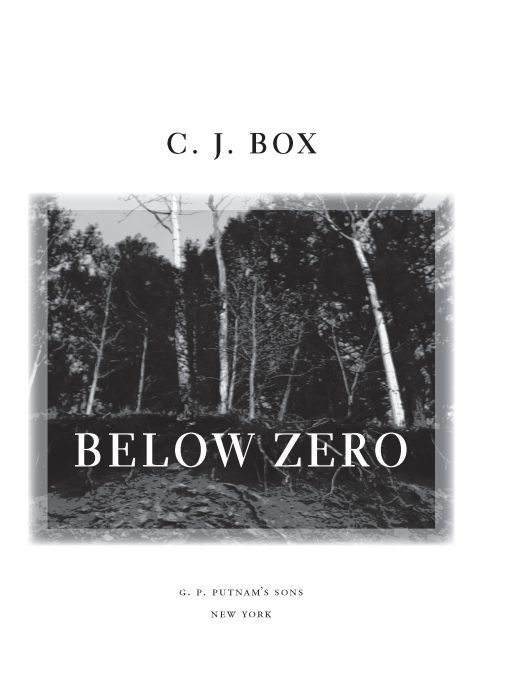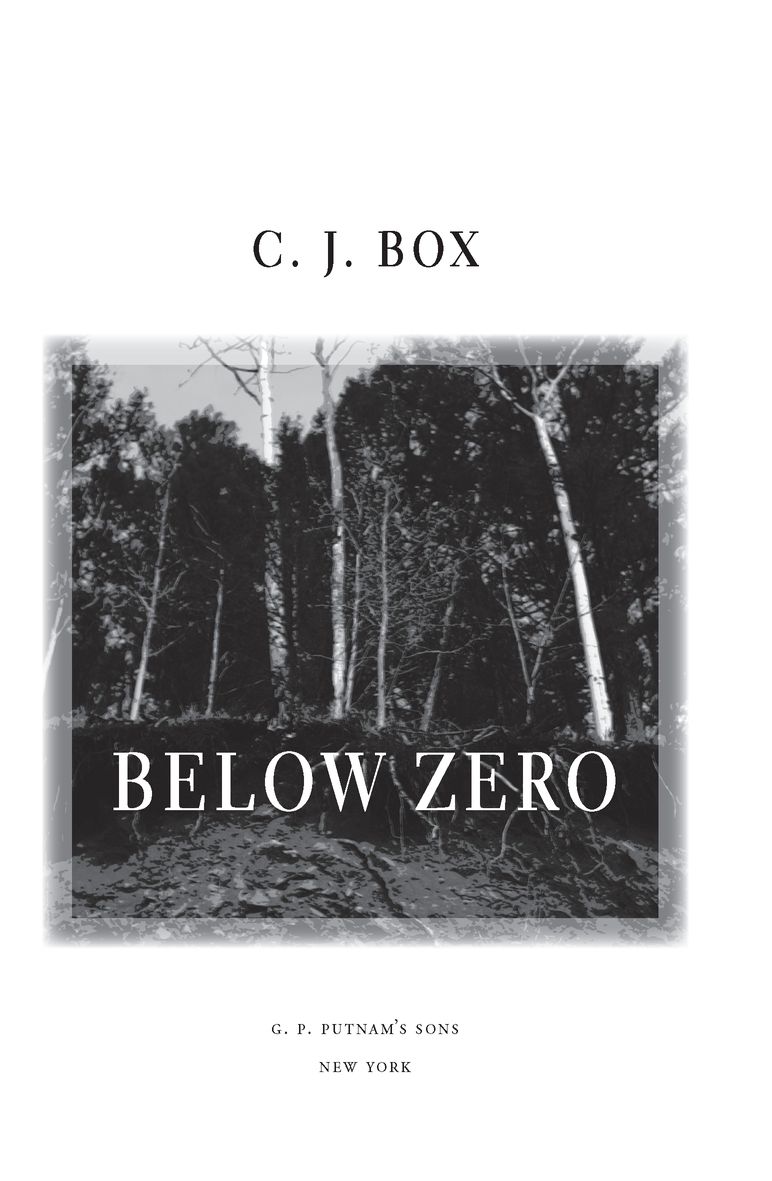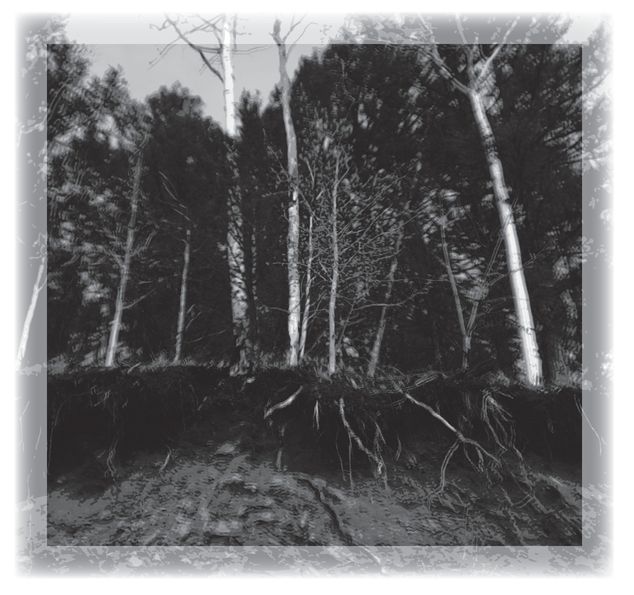Below Zero
Authors: C. J. Box


Table of Contents
ALSO BY C. J. BOX
THE JOE PICKETT NOVELS
Blood Trail
Free Fire
In Plain Sight
Out of Range
Trophy Hunt
Winterkill
Savage Run
Open Season
Free Fire
In Plain Sight
Out of Range
Trophy Hunt
Winterkill
Savage Run
Open Season
THE STAND-ALONE NOVELS
Three Weeks to Say Goodbye
Blue Heaven
Blue Heaven


G. P. PUTNAM’S SONS
Publishers Since 1838
Published by the Penguin Group
Penguin Group (USA) Inc., 375 Hudson Street, New York, New York 10014, USA • Penguin Group
(Canada), 90 Eglinton Avenue East, Suite 700, Toronto, Ontario M4P 2Y3, Canada (a division of Pearson
Canada Inc.) • Penguin Books Ltd, 80 Strand, London WC2R 0RL, England • Penguin Ireland,
25 St Stephen’s Green, Dublin 2, Ireland (a division of Penguin Books Ltd) • Penguin Group (Australia),
250 Camberwell Road, Camberwell, Victoria 3124, Australia (a division of Pearson Australia Group
Pty Ltd) • Penguin Books India Pvt Ltd, 11 Community Centre, Panchsheel Park, New Delhi-110 017,
India • Penguin Group (NZ), 67 Apollo Drive, Rosedale, North Shore 0632, New Zealand (a division
of Pearson New Zealand Ltd) • Penguin Books (South Africa) (Pty) Ltd,
24 Sturdee Avenue, Rosebank, Johannesburg 2196, South Africa
Publishers Since 1838
Published by the Penguin Group
Penguin Group (USA) Inc., 375 Hudson Street, New York, New York 10014, USA • Penguin Group
(Canada), 90 Eglinton Avenue East, Suite 700, Toronto, Ontario M4P 2Y3, Canada (a division of Pearson
Canada Inc.) • Penguin Books Ltd, 80 Strand, London WC2R 0RL, England • Penguin Ireland,
25 St Stephen’s Green, Dublin 2, Ireland (a division of Penguin Books Ltd) • Penguin Group (Australia),
250 Camberwell Road, Camberwell, Victoria 3124, Australia (a division of Pearson Australia Group
Pty Ltd) • Penguin Books India Pvt Ltd, 11 Community Centre, Panchsheel Park, New Delhi-110 017,
India • Penguin Group (NZ), 67 Apollo Drive, Rosedale, North Shore 0632, New Zealand (a division
of Pearson New Zealand Ltd) • Penguin Books (South Africa) (Pty) Ltd,
24 Sturdee Avenue, Rosebank, Johannesburg 2196, South Africa
Penguin Books Ltd, Registered Offices: 80 Strand, London WC2R 0RL, England
All rights reserved. No part of this book may be reproduced, scanned, or distributed in any
printed or electronic form without permission. Please do not participate in or encourage piracy
of copyrighted materials in violation of the author’s rights. Purchase only authorized editions.
Published simultaneously in Canada
printed or electronic form without permission. Please do not participate in or encourage piracy
of copyrighted materials in violation of the author’s rights. Purchase only authorized editions.
Published simultaneously in Canada
Library of Congress Cataloging-in-Publication Data
Box, C. J.
Below zero / C. J. Box.
p. cm.
Below zero / C. J. Box.
p. cm.
eISBN : 978-1-101-06019-3
1. Pickett, Joe (Fictitious character)—Fiction. 2. Game wardens—Fiction. I. Title.
PS3552.O87658B
813’.54—dc22
PS3552.O87658B
813’.54—dc22
This is a work of fiction. Names, characters, places, and incidents either are the product of
the author’s imagination or are used fictitiously, and any resemblance to actual persons,
living or dead, businesses, companies, events, or locales is entirely coincidental.
the author’s imagination or are used fictitiously, and any resemblance to actual persons,
living or dead, businesses, companies, events, or locales is entirely coincidental.
While the author has made every effort to provide accurate telephone numbers and Internet addresses at the
time of publication, neither the publisher nor the author assumes any responsibility for errors, or for
changes that occur after publication. Further, the publisher does not have any control over and
does not assume any responsibility for author or third-party websites or their content.
time of publication, neither the publisher nor the author assumes any responsibility for errors, or for
changes that occur after publication. Further, the publisher does not have any control over and
does not assume any responsibility for author or third-party websites or their content.
For Don Johnson . . .
And Laurie, always
And Laurie, always
PARTY ONE

Evolution loves death more than it loves you or me. . . . We are moral creatures, then, in an amoral world. The universe that suckled us is a monster that does not care if we live or die—does not care if it itself grinds to a halt.
—ANNIE DILLARD
1
Keystone, South Dakota
MARSHALL AND SYLVIA HOTLE, WHO LIKED TO LIST THEIR places of residence as Cedar Rapids, Iowa, Quartzsite, Arizona, and “the open road,” were preparing dinner when they saw the dark SUV with Illinois plates drive by on the access road for the third time in less than an hour.
“There they are again,” Sylvia said, narrowing her eyes. She was setting two places on the picnic table. Pork cutlets, green beans, dinner rolls, iceberg lettuce salad, and plenty of weak coffee, just like Marshall liked it.
“Gawkers,” Marshall said, with a hint of a smile. “I’m getting used to it.”
The evening was warm and still and perfumed with dust and pine pollen particular to the Black Hills of South Dakota. Within the next hour, the smell of hot dogs and hamburgers being cooked on dozens of campground grills would waft through the trees as well. By then the Hotles would be done eating. They liked to eat early. It was a habit they developed on their farm.
The Hotles had parked their massive motor home for the night in a remote campsite within the Mount Rushmore KOA complex near Palmer Gulch, only five miles away from the monument itself. Because it was late August and the roads teemed with tourists, they’d thought ahead and secured this choice site—one they’d occupied before on their semi-annual cross-country trips—by calling and reserving it weeks before. Although there were scores of RVs and tents setting up within the complex below, this particular site was tucked high in the trees and seemed almost remote.
Marshall often said he preferred the Black Hills to the Rocky Mountains farther west. The Black Hills were green, rounded, gentle, with plenty of lots big enough to park The Unit. The highest mountain—Harney Peak—was 7,242 feet. The Black Hills, Marshall said, were
reasonable.
The Rockies were a different matter. As they ventured from South Dakota into Wyoming, both the people and the landscape changed. Good solid midwestern stock gave way to mountain people who were ragged on the edges, he thought. Farms gave way to ranches. The mountains became severe, twice the elevation of Harney Peak, which was just big enough. The weather became volatile. While the mountains could be seductive, they were also amoral. Little of use could be grown. There were creatures—grizzly bears, black bears, mountain lions—capable of eating him and willing to do it. “Give me the Black Hills any old day,” Marshall said as he drove, as the rounded dark humps appeared in his windshield to the west. “The Black Hills are plenty.”
reasonable.
The Rockies were a different matter. As they ventured from South Dakota into Wyoming, both the people and the landscape changed. Good solid midwestern stock gave way to mountain people who were ragged on the edges, he thought. Farms gave way to ranches. The mountains became severe, twice the elevation of Harney Peak, which was just big enough. The weather became volatile. While the mountains could be seductive, they were also amoral. Little of use could be grown. There were creatures—grizzly bears, black bears, mountain lions—capable of eating him and willing to do it. “Give me the Black Hills any old day,” Marshall said as he drove, as the rounded dark humps appeared in his windshield to the west. “The Black Hills are plenty.”
Sylvia was short, compact, and solid. She wore a sweatshirt covered with balloons and clouds she’d appliquéd herself. Her iron-gray hair was molded into tight curls that looked spring-loaded. She had eight grandchildren with the ninth due any day now. She’d spent the day knitting baby booties and a little stocking cap. She didn’t have strong opinions on the Black Hills versus the Rocky Mountains, but . . .
“I don’t like to be gawked at,” she said, barely moving her mouth.
“I hate to tell you this, but it’s not you they’re looking at,” Marshall said, sipping coffee. “They’re admiring The Unit.” Marshall’s belly strained at the snap buttons of his Iowa Hawkeyes windbreaker. His face was round, and his cheeks were always red. He’d worn the same steel-framed glasses so long they were back in style, as was his John Deere cap. He chinned toward the motor home. “They probably want to come up here and take a look. Don’t worry, though, we can have supper first.”
“That’s charitable of you,” Sylvia said, shaking her head. “Don’t you ever get tired of giving tours?”
“No.”
“It’s not just a motor home, you know. It’s where we
live.
But with you giving tours all the time, I feel like I’ve always got to keep it spotless.”
live.
But with you giving tours all the time, I feel like I’ve always got to keep it spotless.”
“Ah,” he said, sliding a cutlet from the platter onto his plate, “you’d do that anyway.”
“Still,” she said. “You never gave tours of the farmhouse.”
He shrugged. “Nobody ever wanted to look at it. It’s just a house, sweetie. Nothing special about a house.”
Said Sylvia heatedly, “A house where we raised eight children.”
“You know what I mean,” he said. “Hey, good pork.”
“Oh, dear,” she said, “here they come again.”
The dark SUV with the Illinois plates didn’t proceed all the way up the drive to the campsite, but it braked to a stop just off the access road. Sylvia could see two people in the vehicle—two men, it looked like. And maybe someone smaller in the back. A girl? She glared her most unwelcoming glare, she thought. It usually worked. This time, though, the motor shut off and the driver’s door opened.
“At least they didn’t drive in on top of us,” she said.
“Good campground etiquette,” Marshall said.
“But they could have waited until after our supper.”
“You want me to tell them to come back later?”
“What,” she said with sarcasm, “and not give them a tour?”
Marshall chuckled and reached out and patted Sylvia’s hand. She shook her head.
Only the driver got out. He was older, about their age or maybe a few years younger, wearing a casual jacket and chinos. He was dark and barrel-chested, with a large head, slicked-back hair, and warm, dark eyes. He had a thick mustache and heavy jowls, and he walked up the drive rocking side-to-side a little, like a B-movie monster.
“He looks like somebody,” Sylvia said. “Who am I thinking of?”
Marshall whispered, “How would I know who you’re thinking of?”
Other books
Blood Ties by Quincy J. Allen
The Keepers (The Alchemy Series) by Augustine, Donna
Rachel Carrington by Choices
Truants by Ron Carlson
Skinner by Huston, Charlie
Desert Cut by Betty Webb
Vodka Politics by Mark Lawrence Schrad
Off the Page by Ryan Loveless
Cliff's Edge by Laura Harner
FrostLine by Justin Scott